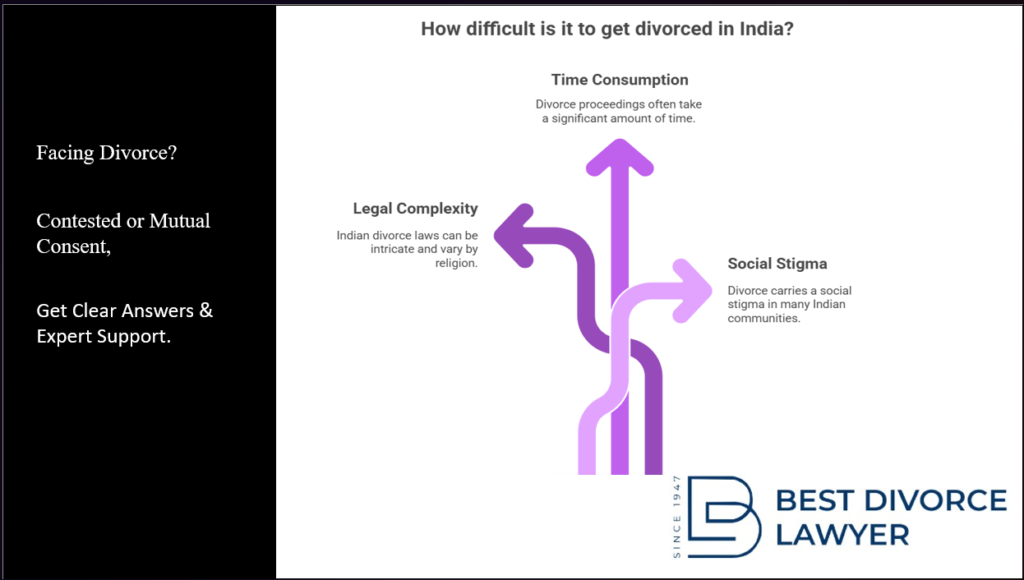Introduction
Embarking on the path of divorce in India can be a complex journey, often fraught with emotional and legal hurdles. This blog explores the intricacies of dissolving a marriage in India, delving into the distinct avenues available and the unique challenges faced by both men and women.
Table of Contents

The Landscape of Divorce in India: Contested vs. Mutual
Indian law primarily recognizes two forms of divorce: mutual consent divorce and contested divorce.
- Mutual Consent Divorce: This occurs when both spouses agree to end their marriage and separate amicably. The law facilitates this path, even providing a “cooling-off period” to encourage reconciliation before the final decree is granted.
- Contested Divorce: This arises when one spouse desires to dissolve the marriage, but the other is unwilling. In such cases, the petitioner must convincingly present legally recognized grounds for divorce to the court, demonstrating why the marriage has irretrievably broken down.
For instance, under the Hindu Marriage Act, 1955, if a Hindu husband seeks divorce based on his wife’s extramarital affair, he must provide concrete proof of adultery. Proving private sexual relationships can be inherently challenging, placing a significant burden of evidence on the party alleging infidelity. This difficulty also extends to other grounds for divorce and separation, where tangible proof is often hard to procure.
The Gendered Experience of Divorce in India
Divorce impacts individuals differently based on their gender, largely due to societal roles and specific legal provisions.
Challenges Faced by Women
Women often experience heightened emotional and financial vulnerabilities during divorce proceedings. Key challenges include:
- Financial Instability: Divorce can lead to significant financial insecurity, especially for women who may have been financially dependent on their spouses or have limited independent income.
- Child Custody and Single Parenthood: While women are statistically more likely to seek and be granted child custody, raising children alone presents unique difficulties and requires immense resilience. Societal factors, including access to support systems and employment opportunities, significantly influence their ability to navigate single parenthood successfully.
Challenges Faced by Men
Men, though often perceived as the “stronger” party, also face distinct challenges in divorce:
- Misuse of Legal Provisions: For men, the alleged misuse of Section 498A of the Indian Penal Code (IPC) (cruelty by husband or relatives) can severely complicate divorce proceedings. This provision, intended to protect women from domestic violence, is sometimes alleged to be invoked falsely, leading to legal difficulties for the husband and his family and hindering the divorce process.
- Emotional Impact: Despite societal expectations for men to be stoic, the emotional toll of a marriage ending is deeply felt. Many men experience profound hurt and emotional distress, though they may not openly discuss it due to societal norms.
Expediting the Divorce Process in India
While obtaining a divorce in India can be protracted, certain avenues offer a relatively simpler and quicker resolution depending on the specific circumstances.
The most straightforward and fastest method to obtain a divorce in India is by filing a mutual consent divorce petition in the family court.
Historically, all divorce cases mandated a six-month “cooling-off period.” However, the Hon’ble Supreme Court of India, in landmark judgments like Amardeep Singh v. Harveen Kaur (2017) and subsequent rulings, has clarified that this six-month period under Section 13B(2) of the Hindu Marriage Act, 1955, is directory, not mandatory. This means that if the court is convinced that all efforts at reconciliation have failed, there is no possibility of resuming cohabitation, and all matters related to alimony, child custody, and property division have been amicably settled, it can waive the waiting period.
If a mutual consent petition is filed following an out-of-court settlement, both the husband and wife must personally file and verify the terms and conditions of the divorce before the court. This ensures that their consent is genuine and not under coercion.
FAQs
Q1. How difficult is it to get an approved divorce in India? Obtaining a divorce, particularly a contested one, is challenging in any country. In India, the perception of marriage as a sacred union adds a layer of complexity. The courts’ primary aim is to preserve the marriage unless reconciliation is genuinely impossible. This inherent judicial inclination makes obtaining a divorce in India, especially a contested one, a demanding process.
Q2. What are the difficulties associated with a contested separation? A one-sided or contested divorce necessitates proving specific legal grounds for dissolution. The main challenge lies in convincing a judge, who has no prior knowledge of the marital relationship, of the multifaceted nature of the breakdown. What one person considers “severe violence” might be perceived differently by another, and isolated incidents, even if numerous, might not always constitute sufficient legal proof for a judge. For instance, in cases involving cruelty, proving a consistent pattern of behavior, rather than isolated instances, is often crucial for a successful outcome.
Q3. Can I file for divorce online in India? Currently, you cannot file for divorce entirely online in India. The process still requires the physical submission of paperwork and petitions to the relevant court with proper verification. However, some initial consultations and legal advice can be sought online.
Q4. Can I get a divorce without my spouse’s approval? Yes, a divorce can be obtained without your spouse’s consent. However, the grounds for divorce must align with the specific personal laws governing your faith (e.g., Hindu Marriage Act, Indian Divorce Act, Muslim personal law). In such circumstances, both parties will present their respective cases to the court. The court will then render a decision after evaluating the evidence and arguments put forth by both sides.
Conclusion
Dissolving a marriage in India presents considerable challenges, whether through mutual agreement or contested proceedings, deeply rooted in both legal frameworks and societal perceptions of marriage. While avenues like mutual consent divorce can offer a faster resolution, gender-specific hurdles and the rigorous demands of proving grounds in contested cases highlight the complexity.
For legal assistance, call +91 9461620006 or visit www.bestdivorcelawyer.in today!


